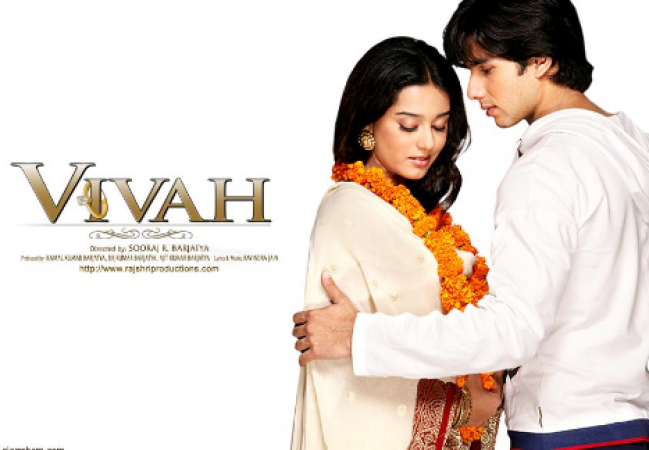
Bollywood, the center of Indian film, has a long history of producing love stories that perfectly encapsulate tradition, family, and love. "Vivah," a 2006 film by Sooraj R. Barjatya that is one of these timeless classics, is one example. The movie has received praise for its depiction of a love story that defies convention and time. The origins of this endearing story, however, can be found in a newspaper article that Tarachand Barjatya found in 1988, which many people might not be aware of. This article explores the intriguing background to "Vivah" and the process of its conception.
The founder of Rajshri Productions, Tarachand Barjatya, was well-known in the Indian film industry in the late 1980s. His goal was to make movies that upheld traditional Indian values and not only entertained while also teaching important lessons about life. During this time, he came across a newspaper article that would later serve as the basis for one of his most cherished films.
The incident that was the subject of the 1988 article took place in a small Indian town. It told the tale of a young couple who were engaged to be married. Tragically, the groom suffered a serious accident just days before their wedding that rendered him paralyzed from the waist down. The bride bravely decided to stand by her fiancé and postpone their wedding until he recovered after being presented with a situation that most people would find unsolvable.
The young bride-to-be's unwavering love and commitment were the focus of the newspaper article. In order to stand by her beloved during his most trying times, she defied social conventions and expectations. Tarachand Barjatya was deeply moved by this amazing display of love and selflessness, and he saw in it the potential for a tale that would not only touch viewers' hearts but also perfectly encapsulate the conventional values he treasured.
Tarachand Barjatya approached his son, Sooraj R. Barjatya, with the idea of making this endearing tale into a feature film after being inspired by the newspaper clipping. Sooraj, who is well known for his love of family dramas, enthusiastically accepted the idea. Together, they set out on a journey to develop the story's characters and plot, adding their own creative touches while adhering to the fundamental themes of devotion and love.
The Hindi word "Vivah," which means "marriage," was intended to be a lovely depiction of the transforming power of love. Prem and Poonam, the two main characters, were portrayed by Shahid Kapoor and Amrita Rao, respectively, and they stood for perseverance, commitment, and unconditional love.
Prem, the male lead, was portrayed as a kind and considerate young man who supported Poonam, his fiancée, during her trying times, just like the real-life groom had done. Poonam, on the other hand, exemplified strength and selflessness by postponing her dreams in order to aid Prem in his recovery.
The challenges and choices the couple had to make as they dealt with expectations from their families and society were expertly handled in the movie. Through a number of heartbreaking turns and turns, "Vivah" showed how love triumphed over hardship, leading to a touching wedding ceremony that moved viewers to tears and inspired them.
The actors who played the characters in "Vivah" were key in giving them life. Prem was one of Shahid Kapoor's earliest roles, and he gave a standout performance, drawing praise for his interpretation of a loving and devoted lover. Poonam was portrayed by Amrita Rao, who won the hearts of the audience with her grace and innocence.
The production of the movie was meticulous, with a focus on capturing the beauty of conventional Indian rituals and ceremonies. The elaborate sets, real-life costumes, and meticulous attention to detail enhanced the film's authenticity and visual appeal. The soundtrack was created by Ravindra Jain and featured evocative melodies that complemented the film's themes of love and devotion.
When "Vivah" was released in 2006, it was well received by both critics and viewers. It resonated with viewers of all ages, reinforcing the enduring allure of classic love tales. Rajshri Productions' reputation for making family-focused, emotionally stirring movies was further cemented by the movie's success.
Beyond its box office success, "Vivah" had a long-lasting influence on Indian cinema because it emphasized the value of conventional values and the enduring strength of love. It served as a timely reminder that true commitment knows no bounds and that love has no boundaries.
The history of how "Vivah" came to be is a testament to the strength of real-life inspiration and the artistic brilliance of Tarachand and Sooraj R. Barjatya. A timeless Bollywood classic that is still beloved by viewers all over the world was made possible by the accidental discovery of a newspaper article in 1988. "Vivah" not only honors love but also serves as a reminder of the beauty of dedication, fortitude, and the enduring allure of traditional values in a world that is constantly changing. It serves as a prime illustration of how a straightforward news article can spawn a masterpiece of the silver screen that will touch the lives of future generations.
Vivah: The Game-Changer that Redefined Indian Movie Distribution
Salman Khan's Role in Katrina Kaif's Journey to 'Namastey London'